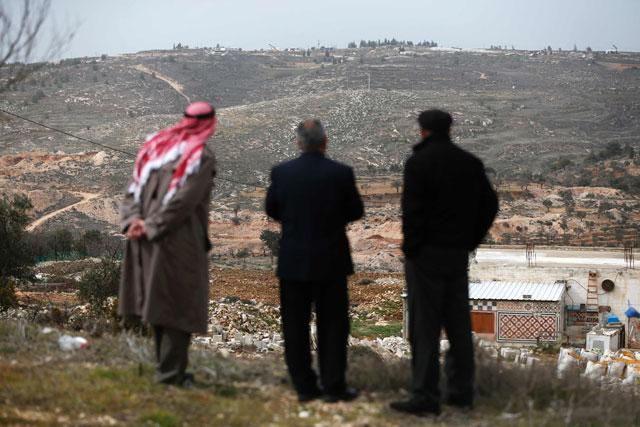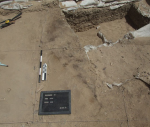You are here
Trump adds nuance to pro-Israel approach ahead of Netanyahu visit
By Reuters - Feb 09,2017 - Last updated at Feb 09,2017

Palestinian children play together on a hill in the village of Um Al Urqan, south west of the West Bank city of Hebron, with the Jewish settlement of Otniel appearing in the background on Thursday (AFP photo)
WASHINGTON/OCCUPIED JERUSALEM — During his election campaign, Donald Trump signalled his presidency would be a boon for Israel and tough on Palestinians. The US embassy would move to Jerusalem, he would name an ambassador who backs Israeli settlements on land Palestinians seek for a state and there would be no pressure for peace talks.
But as Trump prepares for his first White House meeting with Prime Minister Benjamin Netanyahu, his administration has toned down elements of its pro-Israel bravado, suggesting that a president perceived to have acted hastily on many early policy initiatives will be more cautious with Middle East diplomacy.
After nearly three weeks in office, there is growing consensus in the White House that the Israeli-Palestinian conflict will require extensive deliberations and consultations with key lawmakers and US allies before a decision on how to proceed, according to people familiar with the administration's thinking.
"This is a case where campaign promises run head-on into geopolitical reality and they have to be adjusted accordingly," said a US official, speaking on condition of anonymity.
As a result, relocating the US embassy from Tel Aviv to Jerusalem — a step world leaders including His Majesty King Abdullah warned against and which would probably inflame the Muslim world — has been put on hold for now.
At the same time, the White House has adopted a more measured stance on Israeli settlement-building in occupied territory than Trump's campaign rhetoric indicated.
Even so, there is little doubt that when Netanyahu meets Trump on February 15 he will find a Republican president determined to show more warmth to Israel than his Democratic predecessor, Barack Obama, with whom he had an acrimonious relationship.
Social media exchanges have suggested a budding "bromance" between Netanyahu and Trump, who has pledged to be the "best friend" Israel has ever had in the White House.
As a result, Palestinians fear their leaders will be frozen out and their statehood aspirations pushed aside.
Netanyahu, though, may prefer to keep the focus on forging a common front against Iran, Israel’s regional enemy and a target of Trump’s ire, while shunting the Israeli-Palestinian dispute further down the agenda, aides say.
Still, it will be an issue that can’t be ignored, especially after Israel’s parliament on Monday approved a law retroactively legalising 4,000 settler units build on privately-owned Palestinian land. The move drew international condemnation.
Barring a curveball from the sometimes unpredictable US president, Trump is unlikely to use the talks to press Netanyahu for concessions towards the Palestinians — such as a temporary freeze on settlement-building — in the way Obama did.
But neither can Trump afford to be seen to abandon the US commitment to a two-state solution, the bedrock of Washington’s Middle East policy since the 1993 interim peace accords and a principle embraced internationally.
Careful statement on settlements
A White House statement on February 2 set forth a more nuanced position than Trump expressed during the campaign, backing away from a long-standing US view of settlement activity as an “impediment” to peace. Instead, it said new settlements or expanding existing ones beyond their current boundaries “may not be helpful” towards that goal.
That shift transpired just hours after Trump met briefly with King Abdullah on the sidelines of an event in Washington.
Nevertheless, the emerging shape of Trump policy remains decidedly pro-Israel and more accommodating than at any time since Republican George W. Bush occupied the White House.
For the Palestinians, that is troubling.
“It seems we are headed for a new policy with this administration that is different from its predecessor in how it deals with the Palestinian leadership and the Palestinian cause,” said Wasel Abu Youssef, a member of the Palestine Liberation Organisation’s executive committee.
There has been no contact between the Palestinian leadership and the Trump administration so far, Palestinian officials said.
Moderate, Western-backed Palestinian President Mahmoud Abbas was among the first world leaders Obama called on his first full day in office in 2009. A White House official insisted, however, that the Trump administration intends to develop a relationship with the Palestinian Authority. The official did not elaborate.
All the same, many Israeli officials do not read the White House’s settlements statement as a warning to Israel or a reining-in of Netanyahu, rather they see it as largely positive.
Not only does it conclude that settlements do not block peace prospects, it says construction within established settlements, whether major blocs close to Israel or others scattered across the West Bank, is acceptable to Washington.
“Bibi will be happy,” said an Israeli diplomat, using Netanyahu’s nickname. “He can put new settlements on hold and hold off the right wing by pointing to Trump. At the same time, he can build as much as he wants within existing settlements.”
In that regard, the lines drawn by the White House help Netanyahu fend off demands from the far right in his coalition for sweeping steps, like annexing portions of the West Bank.
“There are many decisions that are hostile to the Palestinians,” said Hanan Ashrawi, a senior Palestinian legislator and scholar. “Trump made some promises during the election that cannot be applied on the ground because it would create uncertainty, violence and instability which will be beyond anyone’s ability to control.”
Palestinians would be alarmed if Trump decided to proceed with moving the US embassy to Jerusalem, essentially recognising the city as Israel’s capital despite international objections that its status must be decided in negotiations.
The Palestinians want East Jerusalem, occupied by Israel in the 1967 Middle East war and annexed in a move not recognised internationally, as the capital of their future state.
Trump and his aides have played down the prospects for a quick embassy move since he took office on January 20. But he could come under pressure to address the issue during Netanyahu’s visit. No one can be sure what the president might say.
Moderating influence
Some experts see a moderating influence as Trump fills out his national security team. It has members such as Secretary of State Rex Tillerson, a former Exxon Mobil chief executive with extensive contacts among Gulf Arab governments, and Defence Secretary Jim Mattis, a retired Marine general.
They will have to deal with other, sometimes ideologically driven advisers with close personal ties to Trump. David Friedman, Trump’s former bankruptcy lawyer and now nominee as ambassador to Israel, has raised funds for a West Bank settlement and voiced doubt about Palestinian statehood. The president’s son-in-law, Jared Kushner, whose family has donated tens of thousands of dollars to the same settlement, has been assigned a senior role in Israeli-Arab diplomacy.
Aides may be moving circumspectly also in hope of keeping the door open if Trump — who has touted his skills as a master dealmaker — decides to seek what he has called the “ultimate deal”: Israeli-Palestinian peace.
To pursue such an initiative, the United States needs to be seen as an even-handed mediator, while also overcoming the rigid disputes that have scuppered so many peace efforts over the years: settlements, borders, the status of Jerusalem, what to do with Palestinian refugees, and Palestinian political divisions.
The last, US-brokered round of peace talks collapsed in 2014. It is questionable whether the Trump administration will be inclined to devote much attention to the Israeli-Palestinian issue at a time when it is distracted by other big domestic and international priorities. In the Middle East alone, the fight against Daesh and countering Iran are higher on the Trump agenda.
However, if Trump at some point does opt to wade in where so many of his predecessors have failed, for Netanyahu — who is looking for a reset of US-Israeli relations — it might be a case of “be careful what you wish for”.
Related Articles
OCCUPIED JERUSALEM — US President Donald Trump called on "Israel to be reasonable with respect to peace", spelling out in his own words his
WASHINGTON/OCUUPIED JERUSALEM — Just four months after taking office, Donald Trump will make the earliest foray into Israeli-Palestinian pea
OCCUPIED JERUSALEM — US Secretary of State Mike Pompeo visited Israel on Wednesday for talks with leaders on plans to annex swathes of the o


















